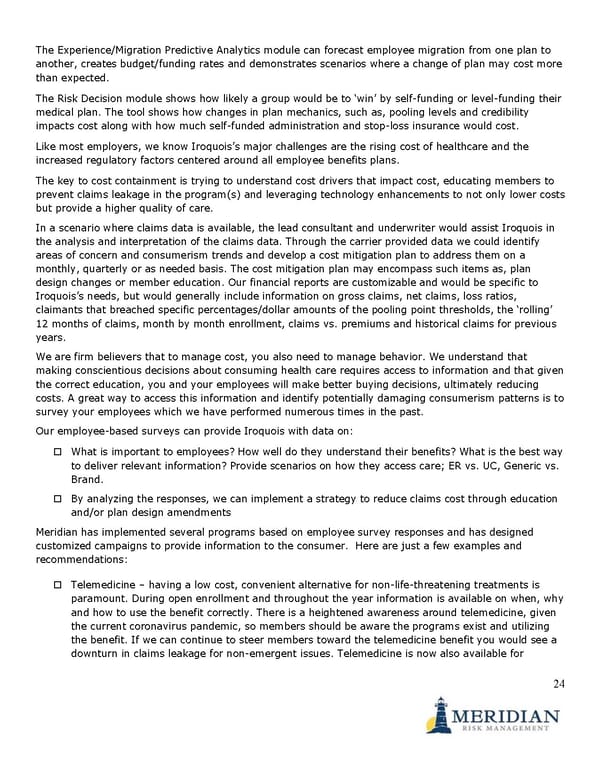The Experience/Migration Predictive Analytics module can forecast employee migration from one plan to another, creates budget/funding rates and demonstrates scenarios where a change of plan may cost more than expected. The Risk Decision module shows how likely a group would be to ‘win’ by self-funding or level-funding their medical plan. The tool shows how changes in plan mechanics, such as, pooling levels and credibility impacts cost along with how much self-funded administration and stop-loss insurance would cost. Like most employers, we know Iroquois’s major challenges are the rising cost of healthcare and the increased regulatory factors centered around all employee benefits plans. The key to cost containment is trying to understand cost drivers that impact cost, educating members to prevent claims leakage in the program(s) and leveraging technology enhancements to not only lower costs but provide a higher quality of care. In a scenario where claims data is available, the lead consultant and underwriter would assist Iroquois in the analysis and interpretation of the claims data. Through the carrier provided data we could identify areas of concern and consumerism trends and develop a cost mitigation plan to address them on a monthly, quarterly or as needed basis. The cost mitigation plan may encompass such items as, plan design changes or member education. Our financial reports are customizable and would be specific to Iroquois’s needs, but would generally include information on gross claims, net claims, loss ratios, claimants that breached specific percentages/dollar amounts of the pooling point thresholds, the ‘rolling’ 12 months of claims, month by month enrollment, claims vs. premiums and historical claims for previous years. We are firm believers that to manage cost, you also need to manage behavior. We understand that making conscientious decisions about consuming health care requires access to information and that given the correct education, you and your employees will make better buying decisions, ultimately reducing costs. A great way to access this information and identify potentially damaging consumerism patterns is to survey your employees which we have performed numerous times in the past. Our employee-based surveys can provide Iroquois with data on: ¨ What is important to employees? How well do they understand their benefits? What is the best way to deliver relevant information? Provide scenarios on how they access care; ER vs. UC, Generic vs. Brand. ¨ By analyzing the responses, we can implement a strategy to reduce claims cost through education and/or plan design amendments Meridian has implemented several programs based on employee survey responses and has designed customized campaigns to provide information to the consumer. Here are just a few examples and recommendations: ¨ Telemedicine – having a low cost, convenient alternative for non-life-threatening treatments is paramount. During open enrollment and throughout the year information is available on when, why and how to use the benefit correctly. There is a heightened awareness around telemedicine, given the current coronavirus pandemic, so members should be aware the programs exist and utilizing the benefit. If we can continue to steer members toward the telemedicine benefit you would see a downturn in claims leakage for non-emergent issues. Telemedicine is now also available for 24
 Meridian Risk Unbranded RFP Page 22 Page 24
Meridian Risk Unbranded RFP Page 22 Page 24